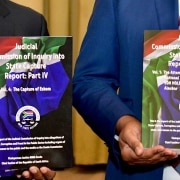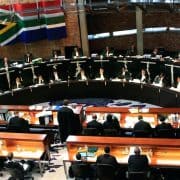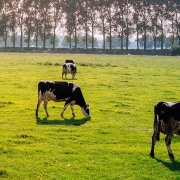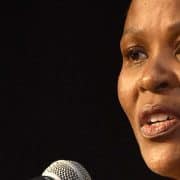|
Getting your Trinity Audio player ready...
|
When asked in a recent interview how it makes her feel to see and hear mainstream and social media commentary referring to her office as not being independent, Public Protector Busisiwe Mkhwebane simply replied: “It is easy for people to say that, when they have not heard the other side of the story.”
She was a guest on the SABC’s current affairs programme, Frankly Speaking, presented by JJ Tabane. “I am here to set the record straight and clarify many issues because at the end of the day, there is a lot of untruth in what people are saying.”
The interview was aired on 25 February. Two weeks later, on 6 March, Mkhwebane appeared in front of Parliament’s portfolio committee on justice over her investigative report on the Free State government’s failed multimillion-rand dairy farm project.
Following the hearing, Corruption Watch called for Mkhwebane’s head. “Recent reports emanating from the public protector demonstrate an extraordinary level of professional incompetence and, of greater concern, a lack of integrity. She has, in the course of her work, not only incurred the displeasure of the public but has suffered the extraordinary rebuke of having a personal costs order imposed on her by the High Court. She is clearly not fit to occupy this high office and must go or be removed.”
Part of Corruption Watch’s argument is that Mkhwebane’s responses to MPs’ questions inspired little confidence in her oversight abilities.
Contradiction between saying and doing
When Tabane asked Mkhwebane to state the highlight of her time in office so far, she expanded on her office’s Vision 2023 programme, mentioning that her team had finalised over 13 000 cases, described as “bread and butter” issues. Then came the big question: Tabane asked if there were any big cases that Mkhwebane could describe as her signature cases, where she can say “this one has shifted the ground as far as the work you’re doing is concerned?”
“There are a lot of cases that I have done, but to me it’s the grassroots, the poorest of the poor who as an office we’re there as their safe haven.” In contrast to this conviction, it was her failure to include the account of planned beneficiaries of the investigation into the Vrede dairy farm project to include people who were meant to benefit from it, which caught the attention of the MPs grilling her.
The project, launched in 2013 between the Free State government and a private contractor called Estina, would receive hundreds of millions of rands in investment from the government. According to the report, one of the allegations was that: “In terms of the agreement the Indian company PARAS, and their South African partner Estina, would receive 49% share with the R228-million investment in the R570-million project, while the 100 local beneficiaries would jointly receive 51% through a government investment of R342-million,” reads the report.
The government did pay, but the beneficiaries did not get what was meant for them. One of them, Meshack Ngcongwane, told the Sowetan newspapers that: “It’s been a long wait. Others kept visiting the mayor’s office over the years, trying to find out what’s happening.” By “others” he was referring to fellow beneficiaries of the project.
“[Former minerals minister Mosebenzi] Zwane explained to us that they wanted black farmers who government would fund … they wanted people who had cows already,” he said. “We were told to even sell the cows we already have because the project would be fully funded and there would be dairy cows at the farm.” This happened at a community meeting in 2012, said Ngcongwane. At the time Zwane was MEC for Agriculture in the province. He became minister in 2015.
The now famous #GuptaLeaks revealed last year that at least R30-million of the over R200-million of government money in dispute allegedly paid to the Gupta family via the farm project, ended up funding the family’s lavish Sun City wedding in 2013.
Selective investigating?
Mkwhebane’s investigation did not involve interviewing Ngcongwane and the rest of the beneficiaries, much to the shock of MPs. Some of them asked why the scope of the investigation was not broadened to cover this, and her response was that there were resource constraints, both financial and human.
The public protector’s report also did not investigate the issue of value for money obtained by the government in terms of the agreement, as this was investigated by the national treasury. The National Prosecuting Authority is investigating allegations that the provincial government paid R220-million to the Guptas in what the Asset Forfeiture Unit labelled “a scheme designed to defraud and steal monies from the department”.
The Council for the Advancement of the South African Constitution, together with the DA, are seeking a judicial review over the maladministration and irregular procurement practices relating to the dairy project.








